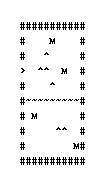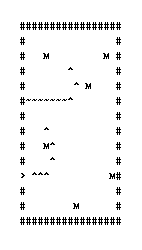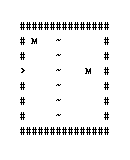Python 2, 3990 3430 4412 4313 bytes
This is a basically an A* with a ugly heuristic and an ugly getChildren method. To run the 3 test cases consecutively takes 6.5s on my machine. The function f is the solution here. It takes the map as a string and returns the solved map as a string.
from itertools import*
import sys
from Queue import*
A,B,C,D,E,F,G=">|\\/-MX";H=range;I=permutations;J=set;K=abs;L=len
class M:
@staticmethod
def T(a):return a in">|\\/-MX"
@staticmethod
def C(a,b,c,d,x,y,e):
if not M.T(d)or not M.T(e):return 0
if e in"MX"and d in"MX"and e!=d:return 1
if d==A:return x>0 and(e==D and y==-1 or e==E and y==0 or e==C and y==1)
if d==F:return e==C and K(x+y)==2 or e==D and x+y==0 or e==B and x==0 or e==E and y==0
if d==G:
if b!=0!=c and K(b-x)+K(c-y)==1:return 0
return e==C and K(x+y)==2 or e==D and x+y==0 or e==B and x==0 or e==E and y==0
if e!=""and e in"MX>"and a!=""and a in"MX>":return M.C("",0,0,a,-b,-c,d)and M.C("",0,0,e,-x,-y,d)
elif e!=""and e in"MX>"and a!="":return M.C("",0,0,d,b,c,a)and M.C("",0,0,e,-x,-y,d)
elif e!=""and e in"MX>"and a=="":return M.C("",0,0,e,-x,-y,d)
elif a!=""and a in"MX>":return M.C("",0,0,a,-b,-c,d)and M.C("",0,0,d,x,y,e)
f=[[E,-1,0,E,1,0,E],[D,-1,1,E,1,0,E],[C,-1,-1,E,1,0,E],[E,-1,0,E,1,1,C],[E,-1,0,E,1,-1,D],[C,-1,-1,E,1,-1,D],[D,-1,1,E,1,1,C],[D,-1,1,D,1,-1,D],[D,-1,1,D,1,-1,E],[D,-1,1,D,1,-1,B],[B,-1,1,D,1,-1,D],[E,-1,1,D,1,-1,D],[B,-1,1,D,1,-1,E],[E,-1,1,D,1,-1,B],[C,-1,-1,C,1,1,C],[C,-1,-1,C,1,1,E],[C,-1,-1,C,1,1,B],[B,-1,-1,C,1,1,C],[E,-1,-1,C,1,1,C],[B,-1,-1,C,1,1,E],[E,-1,-1,C,1,1,B],[B,0,-1,B,0,1,B],[C,-1,-1,B,0,1,B],[D,1,-1,B,0,1,B],[B,0,-1,B,-1,1,D],[B,0,-1,B,1,1,C],[D,1,-1,B,1,1,C],[C,-1,-1,B,-1,1,D]];g=0;h=[a,b,c,d,x,y,e];j=[0,3][a==""]
for k in f:
l=1;m=1;n=[k[6],k[4],k[5],k[3],k[1],k[2],k[0]]
for i in H(j,L(k)):
if k[i]!=h[i]:l=0
if n[i]!=h[i]:m=0
if l or m:g=1
return g
def __init__(s,a):s.m=[list(x)for x in a.split("\n")]
def __str__(s):return"\n".join(["".join(x)for x in s.m])
def A(s):return str(s)
def B(s):return L(s.m[0])
def D(s):return L(s.m)
def E(s):
a=[]
for y in H(1,s.D()-1):
for x in H(1,s.B()-1):
if s.J(x,y)==F and L(s.H(x,y, F))==0:a+=[(x,y)]
return a
def F(s):
for y in H(s.D()):
for x in H(s.B()):
if s.J(x,y)==A:return(x,y)
def G(s):
a=0
for y in H(0,s.D()-1):
for x in H(0,s.B()-1):
b=s.J(x,y)
c=L(s.H(x,y,b))
if b==A:
if c==0:a=(x,y)
c=0
if c==1:return(x,y)
if a!=0:
return a
raise ValueError()
def J(s,x,y):return s.m[y][x]
def K(s,x,y,b):
a=[[i for i in row]for row in s.m];a[y][x]=b
return"\n".join("".join(x)for x in a)
def H(s,x,y,c):
d=[];e=[]
for a,b in J(I([-1,-1,0,1,1],2)):
g=s.J(x+a,y+b)
if M.T(g)and M.C("",0,0,c,a,b,g):e+=[[g,a,b]]
if L(e)==1:return[e[0][0]]
if L(e)==0:return[]
for g,h in I(e,2):
i,j,k=g;l,m,n=h;o=x + m;p=y + n
if M.C(i,j,k,c,m,n,l):
if l==F:
if L(s.H(o,p,l))>=1:d+=[l]
else:d+=[l]
return d
def I(s,x,y,a,b):
if a==0 or b==0:return 0
a=s.J(x+a,y);b=s.J(x,y+b)
return(M.T(a)or a==F)and(M.T(b)or b==F)
class P:
@staticmethod
def A(x0,y0,x1,y1):return K(x0-x1)+4*K(y0-y1)
def __init__(s,a,p,t=0,g=0):
s.a=[];s.b=p;s.c=a;s.d=[a];s.e=t;s.f=g
if p:s.d=p.d[:];s.d+=[a];s.e=p.e;s.f=p.f
s.g=M(a);s.h=s.B()
def __str__(s):return s.g.A()
def B(s):
a=0;b=1;c=0
try:c=s.g.G()
except:a=1
d=s.g.E();e=s.g.F();g=[]
if L(d)==0 and not a:g=P.A(c[0],c[1],e[0],e[1])+b
elif L(d)==0 and a:return 0
elif c:
h,i=c
for j in combinations(d,L(d)):
k=0
for x,y in j:k+=P.A(h,i,x,y);h,i=x,y
g+=[k]
g=min(g);g+=s.g.B()+s.g.D()+b
else:return sys.maxint
if g<1:return 0
return g
def C(s):
try:a=s.g.G()
except:s.a=[];return
b=s.g.J(a[0],a[1]);c=("",0,0);e=(0,0)
for x,y in J(I([-1,-1,0,1,1],2)):
g,h=a[0]+x,a[1]+y;i=s.g.J(g,h)
if M.T(i)and M.C("",0,0,i,x,y,b):c=(i,x,y)
if i=="~":e=(x,y)
for x,y in J(I([-1,-1,0,1,1],2)):
g,h=a[0]+x,a[1]+y;i=s.g.J(g,h)
if not(i in"^#"or M.T(i)):
for j in"-|\\/":
if i=="~":
j=G
if c[0]==G:continue
if c[0]==G and K(e[0])==1 and y==c[1]:continue
if c[0]==G and K(e[1])==1 and x==c[0]:continue
k=s.g.H(g,h,j);l=L(k)
if(l==1 or l==2 and A in k)and M.C(c[0],c[1],c[2],b,x,y,j)and not s.g.I(a[0],a[1],x,y):
try:s.a+=[P(s.g.K(g,h,j),s)]
except:pass
def f(x):
d=[];a=[];b=PriorityQueue();b.put((0,P(x,0)))
while not d and b.qsize():
c=b.get()[1];c.C();a+=[c.c]
for e in c.a:
if e.c not in a:
if not e.h:d=e.d
b.put((e.h,e))
return d[-1]
Try it online!
Test Cases
Test 1

###########
# ---M #
#/ ^ \ #
> ^^ M #
#\ ^ | #
#~X~~~~X~~#
# M | #
# \ ^^\ #
# -----M#
###########
Test 2

#################
# #
# M---------M #
# / ^ / #
# | ^ M- #
#~X~~~~~^ \ #
# | | #
# \^ | #
# --M^ | #
#/ ^- \ #
> ^^^/ \ M#
#\ / \ / #
# -- M---- #
#################
Test 3

###############
# M ~ #
#/ \ ~ #
> --X----M #
#\ ~ / #
# ----X--- #
# ~ #
###############
Source Code
A* State + A* Solver Class
I actually golfed these out of my solution. But they exist in my 'readable' version. The State class is generic and meant to be implemented. The Solver class takes a start state and then follows that states heuristic getDist.
from Queue import PriorityQueue
# A* State
class State(object):
# The type of value should be a primative
def __init__(self, value, parent, start=0, goal=0):
self.children = []
self.parent = parent
self.value = value
self.dist = 0
if parent:
self.path = parent.path[:]
self.path.append(value)
self.start = parent.start
self.goal = parent.goal
else:
self.path = [value]
self.start = start
self.goal = goal
# Implement a heuristic for calculating the distance from this state to the goal
def getDist(self):
pass
# Implement a way to create children for this state
def createChildren(self):
pass
# A* Solver
# Note: if maxmin = 1: Solver tries to minimize the distance
# if maxmin = -1: Solver tries to maximize the distance
class AStar_Solver:
def __init__(self,startState,maxmin=1):
self.path = []
self.visitedQueue = []
self.priorityQueue = PriorityQueue()
self.priorityQueue.put((0,startState))
self.startState = startState
self.maxmin = maxmin
self.count = 0
# Create a png of the string 'qPop'
def imager(self,qPop):
# Imager(qPop,str(self.count).rjust(5,"0")+".png")
# print str(qPop)+"\n"
self.count += 1
# Solve the puzzle
def solve(self):
while(not self.path and self.priorityQueue.qsize()):
closestChild = self.priorityQueue.get()[1]
self.imager(str(closestChild))
closestChild.createChildren()
self.visitedQueue.append(closestChild.value)
for child in closestChild.children:
if child.value not in self.visitedQueue:
if not child.dist:
self.imager(str(child))
self.path = child.path
break
self.priorityQueue.put((self.maxmin*child.dist,child))
if not self.path:
print "Goal was not reachable"
return self.path
State Class
This is the implementation of the A* state class. The most important method here is getDist, it is the heuristic for determining how close self is to the goal. It is basically the minimum distance to visit all the remaining destinations and get back to start.
from A_Star import State,AStar_Solver
from Ruby_Map import Map
from itertools import combinations, permutations
import sys
# A state class designed to work with A*
class State_Pathfinder(State):
# This is deprecated
@staticmethod
def toValue(location):
return str(location[0])+","+str(location[1])
# Calculate the weighted distance between 2 points.
# Not sure why the deltaY is more weighted. My theory
# is that it is because the starting point is always
# on a side. So vertical space is most precious?
@staticmethod
def distance(x0,y0,x1,y1):
# return (abs(x0-x1)**2+abs(y0-y1)**2)**.5
return 1*abs(x0-x1)+4*abs(y0-y1)
def __init__(self, maps, parent, value=0, start=0, goal=0):
super(State_Pathfinder,self).__init__(maps,parent,start,goal)
self.map = Map(maps)
self.dist = self.getDist()
if not value:
location = self.map.getLocation()
self.value = maps
self.path = [self.value]
def __str__(self):
return self.map.getDisplay()
# The heuristic function that tells us
# how far we are from the goal
def getDist(self):
blownup = False
WEIGHT = 1
location = None
try:
location = self.map.getLocation()
except ValueError as e:
blownup = True
destinations = self.map.getDestinations()
goal = self.map.getGoal()
dist = []
if len(destinations) == 0 and not blownup:
dist = State_Pathfinder.distance(location[0],location[1],goal[0],goal[1])+WEIGHT
elif len(destinations) == 0 and blownup:
return 0
elif location:
oldX,oldY = location
for path in combinations(destinations,len(destinations)):
length = 0
for pair in path:
x,y = pair
length += State_Pathfinder.distance(oldX,oldY,x,y)
oldX,oldY = x,y
dist.append(length)
dist = min(dist)
dist += self.map.getWidth()+self.map.getHeight()+WEIGHT
else:
return sys.maxint
if dist<1:
return 0
return dist
# Creates all possible (legal) child states of this state
def createChildren(self):
if not self.children:
try:
location = self.map.getLocation()
except:
self.children = []
return
track = self.map.get(location[0],location[1])
intrack = ("",0,0)
river = (0,0)
for x,y in set(permutations([-1,-1,0,1,1],2)):
realX,realY = location[0]+x,location[1]+y
adjacent = self.map.get(realX,realY)
if Map.isTrack(adjacent) and Map.isConnected("",0,0,adjacent,x,y,track):
intrack = (adjacent,x,y)
if adjacent=="~":
river = (x,y)
for x,y in set(permutations([-1,-1,0,1,1],2)):
realX,realY = location[0]+x,location[1]+y
adjacent = self.map.get(realX,realY)
if not Map.isBlocking(adjacent) and not adjacent in "M":
for outtrack in "-|\\/":
if adjacent=="~":
outtrack="X"
if intrack[0]=="X":continue
if intrack[0]=="X" and abs(river[0])==1 and y==intrack[1]:continue
if intrack[0]=="X" and abs(river[1])==1 and x==intrack[0]:continue
connections = self.map.getConnections(realX,realY,outtrack)
hoppin = len(connections)
connected = Map.isConnected(intrack[0],intrack[1],intrack[2],track,x,y,outtrack)
blocked = self.map.isBlocked(location[0],location[1],x,y)
if (hoppin==1 or hoppin==2 and ">" in connections) and connected and not blocked:
try:
maps = self.map.set(realX,realY,outtrack)
value = State_Pathfinder.toValue((realX,realY))
child = State_Pathfinder(maps,self,value)
self.children.append(child)
except ValueError as e:
print "Bad kid"
print e
# The solution function. Takes a map string
# and returns a map string.
def f(mapX):
a = AStar_Solver(State_Pathfinder(mapX,0))
a.solve()
print a.path[-1]
if __name__ == "__main__":
map1 = """###########
# M #
# ^ #
> ^^ M #
# ^ #
#~~~~~~~~~#
# M #
# ^^ #
# M#
###########"""
map2 = """#################
# #
# M M #
# ^ #
# ^ M #
#~~~~~~~^ #
# #
# ^ #
# M^ #
# ^ #
> ^^^ M#
# #
# M #
#################"""
map3 = """###############
# M ~ #
# ~ #
> ~ M #
# ~ #
# ~ #
# ~ #
###############"""
f(map3)
f(map2)
f(map1)
Map Class
This class stores and processes the map. The isConnected method is probably the most important piece. It tests to see if 2 pieces of track are connected.
from itertools import permutations,combinations
# A map class designed to hold string map
# the specification is found here:
# http://codegolf.stackexchange.com/questions/104965/ruby-on-rails-or-trackety-track
class Map(object):
# Is 'track' part of the railroad?
@staticmethod
def isTrack(track):
return track in ">|\\/-MX"
# Can I not build on this terrian?
@staticmethod
def isBlocking(terrian):
return terrian in "^#" or (Map.isTrack(terrian) and not terrian=="M")
# Are these 3 consecuative tracks connected in a legal fashion?
@staticmethod
def isConnected(inTerrian,relativeXin,relativeYin,centerTerrian,relativeXout,relativeYout,outTerrian):
tin = inTerrian
xin = relativeXin
yin = relativeYin
x = relativeXout
y = relativeYout
tout = outTerrian
center = centerTerrian
if not Map.isTrack(center) or not Map.isTrack(tout):
return False
if tout in "MX" and center in "MX" and tout!=center:
return True
if center == ">":
return x>0 and (\
tout == "/" and y == -1 or \
tout == "-" and y == 0 or \
tout == "\\" and y == 1 \
)
if center == "M":
return tout == "\\" and abs(x+y) == 2 or \
tout == "/" and x+y == 0 or \
tout == "|" and x == 0 or \
tout == "-" and y == 0
if center == "X":
if xin!=0!=yin and abs(xin-x)+abs(yin-y) == 1:
return False
return tout == "\\" and abs(x+y) == 2 or \
tout == "/" and x+y == 0 or \
tout == "|" and x == 0 or \
tout == "-" and y == 0
if tout!="" and tout in "MX>" and tin!="" and tin in "MX>":
return Map.isConnected("",0,0,tin,-xin,-yin,center) and Map.isConnected("",0,0,tout,-x,-y,center)
elif tout!="" and tout in "MX>" and tin!="":
return Map.isConnected("",0,0,center,xin,yin,tin) and Map.isConnected("",0,0,tout,-x,-y,center)
elif tout!="" and tout in "MX>" and tin=="":
return Map.isConnected("",0,0,tout,-x,-y,center)
elif tin!="" and tin in "MX>":
return Map.isConnected("",0,0,tin,-xin,-yin,center) and Map.isConnected("",0,0,center,x,y,tout)
allowed = [ \
["-",-1,0,"-",1,0,"-"], \
["/",-1,1,"-",1,0,"-"], \
["\\",-1,-1,"-",1,0,"-"], \
["-",-1,0,"-",1,1,"\\"], \
["-",-1,0,"-",1,-1,"/"], \
["\\",-1,-1,"-",1,-1,"/"], \
["/",-1,1,"-",1,1,"\\"], \
["/",-1,1,"/",1,-1,"/"], \
["/",-1,1,"/",1,-1,"-"], \
["/",-1,1,"/",1,-1,"|"], \
["|",-1,1,"/",1,-1,"/"], \
["-",-1,1,"/",1,-1,"/"], \
["|",-1,1,"/",1,-1,"-"], \
["-",-1,1,"/",1,-1,"|"], \
["\\",-1,-1,"\\",1,1,"\\"], \
["\\",-1,-1,"\\",1,1,"-"], \
["\\",-1,-1,"\\",1,1,"|"], \
["|",-1,-1,"\\",1,1,"\\"], \
["-",-1,-1,"\\",1,1,"\\"], \
["|",-1,-1,"\\",1,1,"-"], \
["-",-1,-1,"\\",1,1,"|"], \
["|",0,-1,"|",0,1,"|"], \
["\\",-1,-1,"|",0,1,"|"], \
["/",1,-1,"|",0,1,"|"], \
["|",0,-1,"|",-1,1,"/"], \
["|",0,-1,"|",1,1,"\\"], \
["/",1,-1,"|",1,1,"\\"], \
["\\",-1,-1,"|",-1,1,"/"] \
]
passing = False
forward = [tin,xin,yin,center,x,y,tout]
start = [0,3][tin==""]
for allow in allowed:
maybeF = True
maybeB = True
backallowed = [allow[6],allow[4],allow[5],allow[3],allow[1],allow[2],allow[0]]
for i in range(start,len(allow)):
if allow[i]!=forward[i] and str(forward[i])not in"*":
maybeF = False
if backallowed[i]!=forward[i] and str(forward[i])not in"*":
maybeB = False
if maybeF or maybeB:
passing = True
return passing
def __init__(self,mapString):
self.indexableMap = [list(x) for x in mapString.split("\n")]
def __str__(self):
return "\n".join(["".join(x) for x in self.indexableMap])
# Get the string representation of this map
def getDisplay(self):
return self.__str__()
# Get map width
def getWidth(self):
return len(self.indexableMap[0])
# Get map height
def getHeight(self):
return len(self.indexableMap)
# Get unvisited destinations
def getDestinations(self):
destinations = []
for y in xrange(1,self.getHeight()-1):
for x in xrange(1,self.getWidth()-1):
sigma = 2
if self.get(x,y)=="M":
sigma = len(self.getConnections(x,y,"M"))
if sigma==0:
destinations.append((x,y))
return destinations
# Get the x,y of the goal (endpoint)
def getGoal(self):
for y in xrange(self.getHeight()):
for x in xrange(self.getWidth()):
if self.get(x,y)==">":
return (x,y)
# Get the x,y of the current location
def getLocation(self):
location = None
for y in xrange(0,self.getHeight()-1):
for x in xrange(0,self.getWidth()-1):
track = self.get(x,y)
sigma = len(self.getConnections(x,y,track))
if track == ">":
if sigma==0:
location = (x,y)
sigma = 0
if sigma == 1:
return (x,y)
if location != None:
return location
raise ValueError('No location found in map\n'+self.getDisplay())
# Get the terrian at x,y
def get(self,x,y):
return self.indexableMap[y][x]
# Set the terrain at x,y
# (non-destructive)
def set(self,x,y,value):
newMap = [[i for i in row] for row in self.indexableMap]
newMap[y][x] = value
return "\n".join(["".join(x) for x in newMap])
# Get the track connectioning to a piece of track at x,y
def getConnections(self,x,y,track):
connections = []
tracks = []
for a,b in set(permutations([-1,-1,0,1,1],2)):
outtrack = self.get(x+a,y+b)
if Map.isTrack(outtrack) and Map.isConnected("",0,0,track,a,b,outtrack):
tracks+=[[outtrack,a,b]]
if len(tracks)==1:return [tracks[0][0]]
if len(tracks)==0:return []
for inner,outer in permutations(tracks,2):
intrack,relXin,relYin = inner
other,relX,relY = outer
ex = x + relX
ey = y + relY
if Map.isConnected(intrack,relXin,relYin,track,relX,relY,other):
if other == "M":
if len(self.getConnections(ex,ey,other))>=1:
connections.append(other)
else:
connections.append(other)
return connections
# Is could a piece of track at x,y build in
# the direct of relX,relY?
def isBlocked(self,x,y,relX,relY):
if relX==0 or relY==0:
return False
side1 = self.get(x+relX,y)
side2 = self.get(x,y+relY)
return (Map.isTrack(side1) or side1=="M") and (Map.isTrack(side2) or side2=="M")
Updates
- -560 [17-03-31] A bunch of basic regex golfing
- +982 [17-03-31] Fixed illegal track laying. Thanks @fəˈnɛtɪk!
- -99 [17-03-31] Utilized
;s



